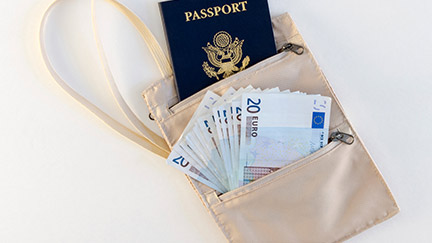10 things you need to know before studying abroad
Planning to study abroad? You nervous? Of course you are. You could never feel 100% prepared for life in a foreign country (that would ruin the drama, wouldn’t it?) but you can check out our top 10 study abroad tips to make your leap of faith a little less scary.
We know you’re pinching every penny, trying to get through the gauntlet of college life. That doesn’t mean you can’t kill it with an incredible backpacking trip. You need to play it smart, though; finding ways to cut corners and watching your wallet very carefully to maximize this adventure. The crew at StudentUniverse has a singular goal here. We want you to grab a backpack, wander confidently, and come back with some cash still in the bank.

The best part about backpacking is that you make the rules, but you need to hit a few checkpoints first. You need to pick the country you want to visit, figure out how exactly you’re getting there, and make sure you still have a little money left over after for your next trip. Use these 10 tips to keep your backpacking trip on budget, while still having the trip of a lifetime.
Get Email Travel Deals
10 things you need to know before studying abroad
Make sure all your paperwork is in order.
Get your passport as early as possible, and apply for your visa(s) on time (if you’re reading this and wondering “Visa? What visa?” please open a new tab and look up your chosen country's visa requirements immediately). If you have a passport, double and triple check the expiration date. Make sure it will last you well beyond your semester abroad.
Secure your courses, flights and housing.
All study abroad programs are unique, but most involve traditional coursework. Know what classes you’ll be taking and when they meet (so you can plan activities around that schedule) and where you’ll be staying (to determine your commute). If you’re doing some travel before your semester begins, that’s great! Just make sure you’ve booked a flight to your study abroad destination. That’s the whole point of the trip, so don’t leave it up to chance. Book your study abroad flights with StudentUniverse for the cheapest airfare.
Keep up to date with the currency exchange.
When deciding where to study abroad, many students consider daily expenses, but some of the cheapest countries to visit are also the least stable. Don’t assume that the US dollar will have the same value when you’re studying abroad as it did when you checked the exchange rate five months ago, especially if your country has a particularly volatile economy. Even small changes can make a big impact when you're budgeting for months instead of days, and you could suddenly find yourself spending Western Europe money in what you thought was a budget-friendly destination.
Watch the news for any updates on your destination.
You’ll want to know if your study abroad country’s economy is tanking, if their metro system is falling apart, if they’re experiencing major political upheavals, if they’re in the middle of a health crisis, etc. Some of the best places to study abroad are in economic or political flux, so don’t panic over every little incident. Simply work new knowledge into your existing study abroad plans. Worst case scenario, the country closes its borders and your study abroad trip gets suspended. Student travel insurance will protect you in events like these.
Register your semester with your home government.
You’re going overseas. Wifi might be spotty, cell coverage could be non existent and sometimes you’ll be 100% on your own. It’s one of the reasons why study abroad is so exciting, but it also makes you vulnerable. Take comfort in the fact that, whatever happens, the government has you on their radar and knows who to contact in an emergency.
Get all necessary health check ups and vaccinations.
Your doctor might recommend you visit a travel clinic, where you’ll find out exactly what you’ll need to stay healthy overseas. Contact your health insurance company to let them know where and when you’ll be traveling and request your prescriptions in advance.
Organize your flights and itinerary.
Gather all your plane tickets, itineraries, maps, etc., and keep them on hand (or in your bag, actually—we don’t want any boarding passes or bus tickets left in seat pockets) for stress-free, efficient travel. By getting everything organized ahead of time, you can lay back and enjoy the ride—especially when you consider all the money you saved with our exclusive student discounts!
Let multiple people know where you are going and how to get in contact.
Obviously you should let friends and family know you’re studying abroad—that’s a given. But make sure to check in frequently during your trip, and let people know if you’re leaving campus on weekend trips or school breaks. You don’t need to live stream every extracurricular adventure, but don’t fall of the grid entirely.
Talk to your bank.
Meet with your bank to find out how your credit and debit cards work overseas. Some banks will have their own, hassle-free atms in your area, and some might have regional partners that don’t charge a fee for withdrawing cash. If you belong to a smaller bank that doesn’t have an international presence, plan for that. Lean on a traveler’s credit card as much as possible, and only take out cash when absolutely necessary.
Make sure all your credits will be accepted at your home university.
Study abroad programs pre-approved by your department should be no problem, but if it’s something you found online or through another office, you should speak with an academic advisor to make sure you’ll be on track when you return to college. The last thing you want after studying abroad is to find out that none of those classes count toward your degree.
Feel any better? Good. Just remember to pack wisely, budget well and embrace your study abroad experience. You got this :)








